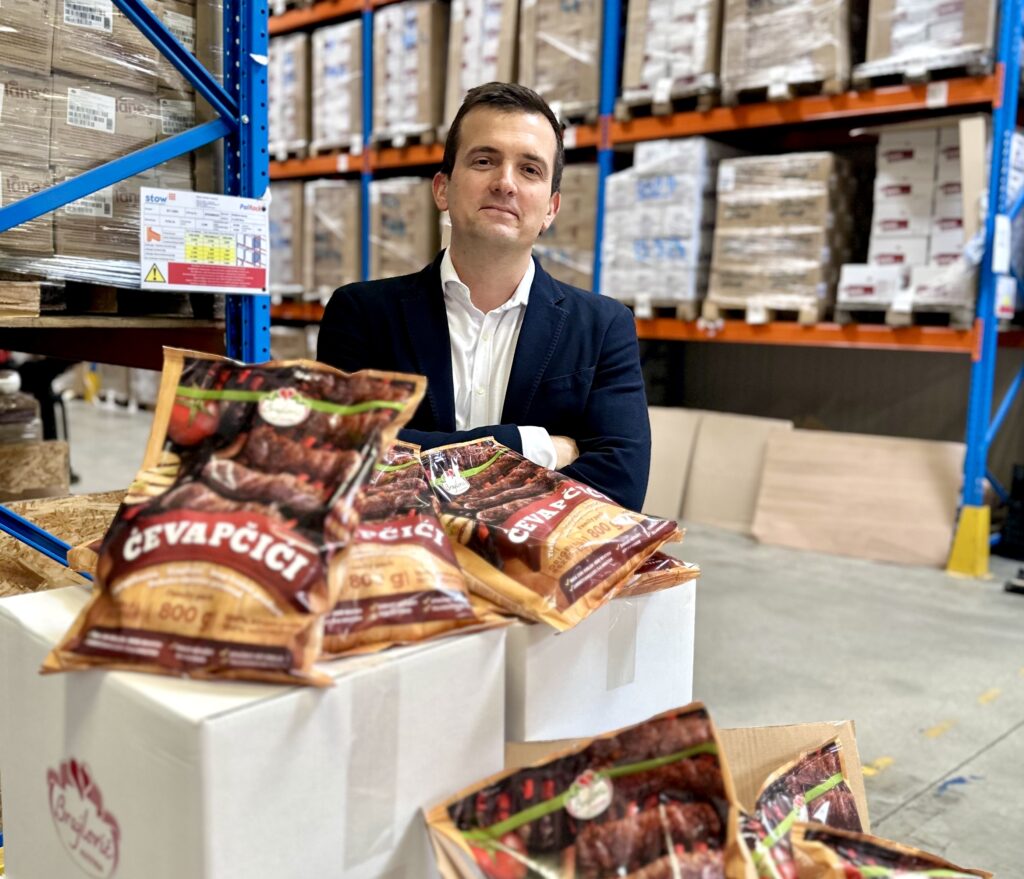Success story. How a former Bosnian WU student managed to pave the way for the popular dish, as well as other Balkan delicacies, into supermarkets throughout Europe.
What does a student from the Balkans do when they want to satisfy their craving for food from their homeland in Vienna? Yes, they go to one of the numerous Balkan restaurants and indulge themselves. “That would be a temporary solution. However, Mirza Haračić wanted a permanent one, and not just for himself.” That’s why he, together with two fellow students, founded a company that now satisfies the longing of many compatriots for authentic Ćevapčići and other Balkan delicacies.
In 1995, Mirza Haračić came to Vienna from Bosnia and Herzegovina for his studies. Soon, he would realize that despite the geographical proximity and a large community, it was challenging to find products from his homeland in local grocery stores. Our idea was to change that,” recalls the now 46-year-old as he and two other WU students recognized the significant market gap.
Domestic production
So, the students established contact with a large Bosnian meat processing company that expressed interest in collaborating. However, a significant hurdle had to be overcome. Bosnia, as a non-member country, couldn’t export its meat to the EU. So, the Bosnian partner wanted to know if production in Austria and distribution throughout the entire EU could be organized.

“The products were too exotic for buyers, even though so many people from the Balkans were already living here at that time,” Mirza Haračić explained.
“So, three students, along with the partner from Bosnia, founded Brajlovic GmbH,” explained the company’s CEO, which is now called Adriatic Group, employs 70 people in Vienna alone, and is one of the leading companies in the field of food production and distribution from Western Balkan countries to the EU market.” “At the beginning, we only produced beef jerky (Bosnian: Suho meso) and beef sausage (Sudžuk), later Ćevapčići were added. Then we also started wholesale trade of other foods like coffee, sweets, pickled vegetables, and so on,” explained Haračić, whose company fills the majority of shelves with Balkan products in Austrian supermarkets.” Today, these shelves are no longer an exception but rather a rule. In the 1990s, this was not a given.
“The buyers in the supermarkets were initially skeptical. The products were too exotic for them, even though so many people from the Balkans were already living here at that time,” says Haračić and draws a parallel to Scandinavia: “There, you find 12 to 15-meter-long shelves in supermarkets filled only with Balkan products. In Austria, it’s still quite conservative.” Why is that? “It’s because of society. Scandinavia has always been more open to immigrants. People there are more willing to try new products.”
But even in Austria, buying behavior has changed significantly in recent years. “You can feel that we from the Balkans are a part of this society.” But it’s not just people from the Balkans who are well integrated in Austria, it’s also a dish that you can’t imagine missing from the menus of local restaurants: Ćevapčići. Referring to the delicious meat fingers as a “migrant with Austrian background”, Haračić says with a smile.
“The name comes from another country, but the meat, spices, and production are Austrian,” he points out, referring to the production in a facility on the outskirts of Vienna. By now, a four-figure tonnage of Ćevapčići, produced according to the Bosnian recipe, makes its way from here to buyers in Austria and the EU.
Love for meat
One cliché question that must be asked of Austria’s “Ćevapčići Emperor”: Can people from the Balkans not do without meat? “More or less. In this community, you’ll probably find the fewest vegans and plenty of people who can’t go a day without it
hold meat for a lost day,” he answers with a smile but also admits that compared to his Balkan friends, he eats much less meat than he used to.
“You can already feel a bit of integration,” the entrepreneur jokes but makes it clear without a doubt, “Meat is what defines our company.” With time, despite their great love for meat, Adriatic Group wants to evolve and also appeal to new generations who choose to abstain from meat.
“There have been ideas on how we could produce our Ćevapčići from soy, wheat, or peas. We’ve even made samples,” Haračić explains. But we’re not at a point where we would bring them to the market yet, he adds. There’s a good reason for that: “It must taste exactly like Ćevapčići first. We won’t sell anything until it’s perfected,” he emphasizes.
Taken from www.kurier.at (Mirad Odobašić, 24.09.2023)
